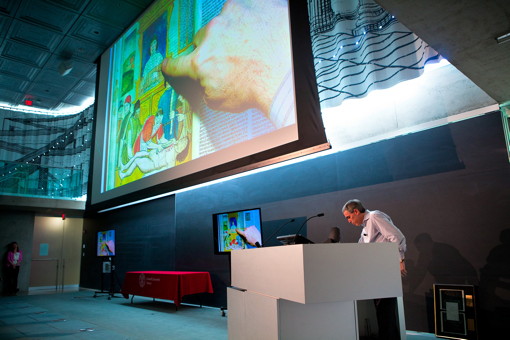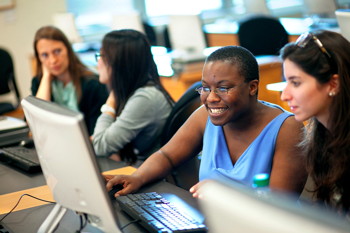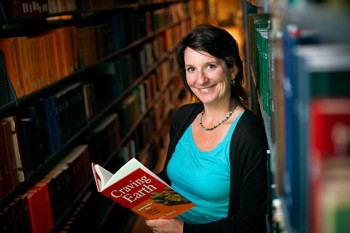COVER STORY
The library that never sleeps: 24/7 access, on campus and around the world
(page 3 of 5)
But challenges persist: Due to lean economic times and severely restricted budgets, total library expenditures have dropped by 6 percent in the last five years (adjusted for inflation).
"We need to constantly evaluate what we're doing and how well we meet the needs of our users, and tracking use patterns and trends carefully is the best way to do that," Kenney says.

Jay Walker '77 shows an image of the first medical text during a Reunion lecture in Milstein Hall in June. The library is currently hosting the first public viewing of selections from Walker's private collection, which chronicles human imagination.
The library has consolidated several of its physical collections during the last few years. It is saving money on lesser-used circulation locations, like entomology, engineering and physical sciences, and books and periodicals from the hotel and management libraries have been combined into a single location at the ILR School.
Much of those savings fund the online resources that a 21st-century research environment demands and help retain expert librarians. These subject specialists help patrons in a variety of ways, online and in person, and stay close intellectually and physically to the departments they support.
The 'everywhere' librarian

Camille Andrews, a learning technologies and assessment librarian who teaches information literacy, works with a student. See larger image
If a modern-day academic library is everywhere in the virtual world, librarians themselves are everywhere too – especially in the classroom, teaching students and taking collaborative roles with faculty members.
Over the course of a typical Cornell academic year, more than 22,000 people (students, researchers, faculty and others) participate in a presentation led by a library staff member.
These presentations take on a variety of formats, from one-off, drop-in workshops and library tours to semesterlong, for-credit courses like the Hotel School's "Information Survival Skills" or the Law library's courses jointly taught by a librarian and a professor. Last fall, Olin Library hosted an immersion program for Ph.D. students in the humanities that helped students transition from students to scholars.
That program and many others address information literacy, or the ability to find, evaluate and effectively use information from reliable sources. Helping to increase that skill is one of the library's primary goals, and it was recently included among seven essential learning outcomes as part of Cornell's assessment of student learning.
"There's a really common perception that you can just Google something and find perfectly reliable information," says Camille Andrews, learning technologies and assessment librarian. "Most students entering Cornell haven't had any training in information literacy before. They've never been introduced to thinking about doing research for in-depth academic purposes." Information literacy is incorporated into curricula across the university, in regular classes and targeted workshops.

Sera Young, Ph.D. '08, research scientist in nutritional sciences, gave a "Chats in the Stacks" talk on her research. See larger image
"It's absolutely critical for not only a successful academic career, but also for just living in a democratic society," Andrews adds. "All the time, people make truth claims. If you can't think critically about how to evaluate information, you can't function in the modern world."
And the library itself is a central source of information: Cornell library staff members answer about 84,000 research and other substantive questions every year. They answer in person, at reference desks and on the phone, and via blogs, live online chats and text messages. In a survey of Cornell seniors this year, 87 percent said the library contributed to their ability to conduct research; 85 percent said that the library contributed to their academic success and efficiency. These numbers show a 2 percent to 5 percent uptick from 2010.
<<View entire story as one page>>